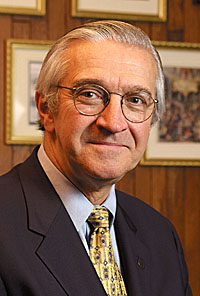  |
| HOME | THIS ISSUE | CALENDAR | GRANTS | BACK ISSUES | < BACK | NEXT > |
Deckers to step down from Health Center leadershipby Kristina Goodnough - July 23, 2007 |
||||
| Dr. Peter J. Deckers, dean of the School of Medicine since 1995 and executive vice president of health affairs since 2000, has informed the University leadership that he will step down from both positions on June 30, at the conclusion of his appointment.
On behalf of the University, President Philip E. Austin expressed “deep appreciation for Dr. Deckers’ farsighted leadership at the Health Center. Austin said the timing of the announcement will allow for an orderly transition. “In order to begin the process of choosing a new executive vice president and dean,” he said, “I am establishing a search committee that will be chaired by Dr. Richard Garibaldi and supported by the services of a national recruitment firm. Other members of the committee will be announced shortly.” Garibaldi, who recently stepped down as chair of the Department of Medicine, has been with the Health Center since 1982. He served as director of the Internal Medicine Residency Program for 17 years, before becoming department chair 10 years ago. “The initiation of the search comes at a time when the committee charged with recruiting my own replacement is narrowing the list of candidates,” said Austin. “I expect the Board of Trustees will appoint the new University president shortly. Ultimately the decision on the next executive vice president and dean will be made by the next president and the Health Center Board of Directors. Nevertheless, Board of Directors Chairman Dr. Gerald Burrow, Board of Trustees Chairman Dr. John W. Rowe, and I believe that it is prudent to begin the search for a new Health Center leader now,” said Austin. Deckers’ leadership of the UConn Health Center has been marked by a transformation of the educational curriculum, by a dramatic increase in patient care provided by John Dempsey Hospital and the UConn Medical Group, and by strong growth in public and private research awards to biomedical scientists and clinicians. Deckers joined the Health Center in 1987. He took the top administrative position in 2000, after a year as interim. At the time, the Health Center was in a period marked by low reimbursement rates from Medicare, Medicaid, and health insurers looking to rein in skyrocketing costs. Deckers was instrumental in the lobbying effort that won for the Health Center special financial assistance of $20 million from the state legislature. He then helped engineer a turnaround that achieved $74 million in cost reductions and revenue enhancements, focused resources on areas of excellence, stepped up recruitment of nationally prominent physicians and researchers, and brought more patients to the Health Center. “It’s been a remarkable tenure,” says Dr. Bruce Koeppen, dean of academic affairs. Deckers believed that the Health Center’s special strength came from its combined mission of research, education, and clinical care, Koeppen adds. By supporting the development of research strategic plans, he pushed the institution to identify specific areas of expertise and to focus its resources on those areas of strength. “The ultimate purpose of our signature programs is to build a stronger Health Center by closely linking areas of research excellence with areas of clinical excellence,” Deckers said at the time. The Health Center built a new building to house its New England Musculoskeletal Institute and expand research and clinical care in orthopedics, arthritis, bone biology, biomaterials and biomechanics. Musculoskeletal disease and bone biology is one of the Health Center’s signature programs — along with cancer, cardiology and public health — that grew out of the strategic planning process. His leadership yielded significant results. Between 1999 and 2005, external research award expenditures by the Health Center almost doubled, to nearly $93 million. During roughly the same time frame, annual admissions to the hospital increased 42 percent to 9,826, and annual patient visits to the UConn Medical Group rose 49 percent to 507,000. Also under his leadership, the Health Center was recognized several times by Solucient, a leading health care information company. In 2007 it was named a top 100 hospital, and in both 2006 and 2005 it was named a top 100 performance improvement leader. The Health Center, in collaboration with the University’s Storrs campus, also became a national leader in human embryonic stem cell research by spearheading research projects that won the lion’s share (60 percent of $20 million) of Connecticut’s first disbursal of funds for stem cell work. As dean of the School of Medicine, Deckers supported the development of a new curriculum that won national recognition for the Health Center. And during his tenure, the School of Dental Medicine twice ranked No. 1 among the country’s 55 dental schools, based on national examination results. Deckers earned his medical degree from the Boston University School of Medicine, where he received the Outstanding Physician Award. He completed his residency in general surgery and was a U.S. Public Health Service trainee in academic surgery at Boston University Medical School, where he began his career. He joined the Health Center after three years as chairman of surgery at Hartford Hospital. |
| ADVANCE HOME UCONN HOME |

